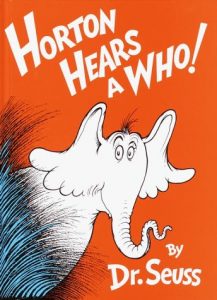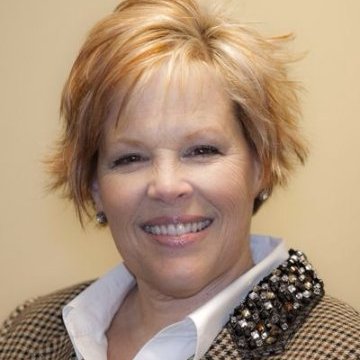 Reading stories was my main interest in life as a child, and as an only child with alcoholic parents I had a great deal of time on my hands. Reading the compassionate Horton Hears a Who by Dr. Seuss out loud from cover to cover before I was 5 years old remains a favorite memory. Shortly thereafter I was able to inhale all picture books available to me before I was 6 and begin chapter books before I was 7. By the time I was 12, I was reading Russian and French literature with their themes of hopelessness, revenge, and religious repression.
Reading stories was my main interest in life as a child, and as an only child with alcoholic parents I had a great deal of time on my hands. Reading the compassionate Horton Hears a Who by Dr. Seuss out loud from cover to cover before I was 5 years old remains a favorite memory. Shortly thereafter I was able to inhale all picture books available to me before I was 6 and begin chapter books before I was 7. By the time I was 12, I was reading Russian and French literature with their themes of hopelessness, revenge, and religious repression.
These same works of literature created an understanding in me that impacts my genealogical work today: people are complicated. I find that humanity is indeed courageous and sordid, innocent and cowardly, noble and muddled. Fast forward to a mature adulthood and I realized that I am no different from this humanity, and that I, too, am complicated and full of contradictions.
Consequently, accepting my own complexity truly prepares me to be a family historian and a genealogical researcher: I am too flawed to judge, but I am not too blind to see. We each have a personal story to tell with a familial story to tell of present and past, courage and virtue, sacrifice and selfishness. Understanding this when I research, I do not take that famous broad brush and paint an individual villain or victim, but, instead, I use a pencil with an eraser writing of a life from the uncovered facts—while accepting that I cannot know all the facts and factors or all the motivations behind our life choices.
For example, when I began researching why my family seemed so broken, I was much younger and still too damaged by the choices of my ancestors. Years later when I had finished raising a very strong-willed, large, and complicated family amidst plenty of parenting mistakes, I had a different perspective on runaway mothers, absentee fathers and generations of alcoholism. I cannot deny that I could have done better, but I did the best I understood—and that is now part of my life story.
Genealogical storytelling, I believe, is about discovering information through reliable documentation and putting it into humanitarian context; I believe that it is about celebrating with those who succeed, sorrowing for the broken, and rejoicing for those who keep trying.
So let all the stories of celebration, sorrow, rejoicing, and complexity begin here at Family Lines and Stories. Today.
Patti Gillespie, The Gen Lady

Well written, well said! You are so very talented! I am proud to be one of your aquaintances, students, and friend!
I am excited to follow you on this journey. I share some of the same history.
meaningful. C:
Thank you, Melanie, for taking the time to visit my blog.